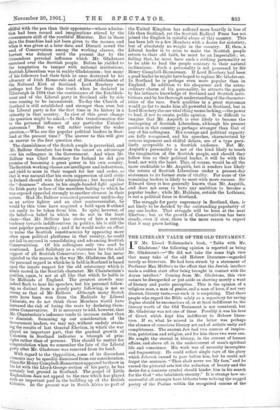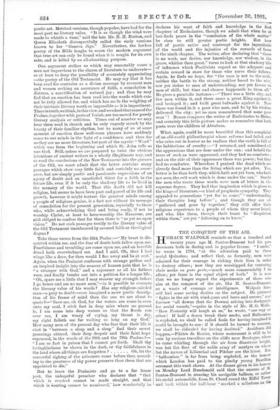THE LITERARY VALUE OP THE OLD TESTAMENT.
IN Mr. Lionel Tollemache's book, " Talks with Mr. Gladstone," the following opinion is reported as being.
Mr. Gladstone's He did not take the same high view that many take of the old Hebrew literatnre—regirded merely as literature. He had been struck . by a statement of Professor Max-Midler's to the effect that the Jewish intellect made a sudden start after being brought in contact with the Aryan intellect." Coming from Mr. Gladstone, this view cannot be disregarded or put aside' as showing merely a want of literary and poetic perception. This is the opinion of a religious man, a man of genina,-and a man of keen, if not very discreet, literary taste,—as- such it is surprising. That those people who regard the Bible solely as a repository for saving dogma should be unconscious of, or at least indifferent to, the literary :worth of the Old Testament is not unnatural, but Mr. Gladstone was not one of these. Possibly it was his love of Greek which kept him indifferent to Hebrew litera- ture. If so, what he missed in the latter was perhaps the absence of conscious literary art and of artistic unity and completeness. The ancient Jew had two sources of inspira- tion, patriotism and religion, and for him these two were one. He sought the eternal in history, in the current of human. affairs, and above all in the undercurrent of man's spiritual life and conscience. His work was of necessity incomplete . and fragmentary. He could reflect single rays of the glory which Jehovah caused to pass before him, but he could not forget the sentence, " Thou shalt never see My face," andhe cursed the pictorial arts lest the seduction of beauty and the desire for a concrete symbol should hinder him in his Search. for the God-" who inhabiteth eternity." It is strange how 'um-' successful all attempts have hitherto been to bring the rugged poetry of the Psalms within the recognised canons of the
poetic- art. Metrical versions, though popular, have had for the most part no literary value. "It is as though the wind were made to whistle a tune," said the late Mr. R. H. Hutton, and Queen Elizabeth disrespectfully called the early versions known to her " Geneva Jigs." Nevertheless, the lawless poetry of the Bible laughs to scorn the modern argument that true art can only be found when it is sought for its own sake, and is killed by an all-absorbing purpose.
One argument strikes us which may reasonably cause a man not impervious to the charm of literature to underrate— or at least to deny the possibility of accurately appreciating —the poetry of the Old Testament. He may say that it has been read for centuries as a divine message by reverent men and women seeking an assurance of faith, a consolation in distress, a sanctification of natural joy ; and thus he may feel that an emotion has been read into the words which can- not be fully allowed for, and which has made the weighing of their intrinsic literary worth as impossible as it is impertinent. There is truth,we think, in th is view, and we admit that some of the Psalms, together with parts of Isaiah. are too sacred for purely literary analysis or criticism. Times out of number we may hear them read in church and be only vaguely struck by the beauty of their familiar rhythm, but to many of us at some moment of emotion these well-worn phrases have suddenly come to our minds in the light of a confidence, and then for us they are no more literature, but part of the mystic " Word" which was from the beginning and which St. John tells us was God. Still, unless we are prepared to twist the obvious intentions of ancient writers in a wholly illegitimate way, and to read the conclusions of the New Testament into the guesses of the Old, we must admit that the latter contains many passages which show very little faith and certainly no assur- ance, but are simply poetic and passionate expressions of an agony of doubt and an unsatisfied thirst for a faith in the future life, even if it be only the shadowy life to be lived in the memory of the world. That this doubt did not kill religion, but seems to have been part and parcel of its life and growth, however it might torture the greatest minds among • a people of religious genius, is a fact not without its message of consolation for the present generation, especially to those who, while acknowledging God and being ready, if not to worship Christ, at least to hero-worship the Nazarene, are still obliged to confess that for them there is "as yet no open vision." Do not such passages testify to the literary value of the Old Testament unenhanced by assured faith or theological dogma P Take these verses from the 55th Psalm :—" My heart is dis- quieted within me, and the fear of death hath fallen upon me.
Fearfulness and trembling are come upon me, and an horrible dread bath overwhelmed me. And I said, Oh, that I had wings like a dove, for then would I flee away and be at rest."
Again, when the Psalmist confesses with strange pathos and an inspired insight into the sources of human pain that he is " a stranger with God," and a sojourner as all his fathers were, and finally breaks out into a petition for a longer life " Oh, spare me a little that I may recover my strength before I go hence and am no more seen,"—is it possible to overrate the literary value of his words ? Has any religious minded man—a prey to doubt—ever imagined a more poetic descrip- tion of his frame of mind than the one we are about to quote ?—" Save me, oh God, for the waters are come in even unto my soul, I stick fast in deep mire where no ground is, I am come into deep waters so that the floods run over me, I am weary of crying, my throat is dry, my sight faileth me* for waiting so long on my God."
How many men of the present day who fear that their life is shut in "between a sleep and a sleep " find their secret groanings uttered, their deep despair and their faint hope expressed, in the words of the 88th and the 79th Psalms ?— " I am so fast in prison that I cannot get forth Shall thy lovingkindness be shown in the dark, or thy faithfulness in the land where all things are forgotten P Oh, let the sorrowful sighing of the prisoners come before thee, accord- ing to the greatness of thy power preserve thou them that are appointed to die."
But to leave the Psalmists and go to a far lesser poet, the unhopeful preacher who declares that " that which is crooked cannot be made straight, and that which is Wanting cannot be numbered," how wonderfully he
declares his want of faith and knowledge in the first chapters 'of Ecclesiastes, though we admit that when he at last finds peace in the " conclusion of the whole matter" he rises to still greater poetic heights. But how full of poetic satire and contempt for the ingratitude of the world and the injustice of the rewards of fame is the ninth chapter. The writer, after declaring that "there is no work, nor device, nor knowledge, nor wisdom, in the grave, whither thou goest," turns to look at that shadowy life of influence which Positivists regard as the adequate and certain reward in store for those who serve their fellows, Again, he finds no hope, for "the race is not to the swift, neither the battle to the strong, neither bread to the wise, nor yet riches to men of understanding, nor yet favour to men of skill; but time and chance happeneth to them all." He gives a parabolic instance :—" There was a little city, and few men within it, and there came a great King against it, and besieged it ; and built great bulwarks against it. Now there was found in it a poor wise man, and be by his wisdom delivered the city; yet no man remembered that same poor man ! Renan compares the writer of Ecclesiastes to Heine, and certainly this little picture makes us remember that both poets were the children of Abraham.
What, again, could be more beautiful than this complaint of an old-world philanthropist whose reforms had failed, and who cries out in horror as he realises that the earth is full of the habitations of cruelty I returned, and considered all the oppressions that are done under the sun : and beheld the tears of such as were oppressed. and they had no comforter ; and on the side of their oppressors there was power; but they had no comforter. Wherefore I praised the dead which are already dead more than the living which are yet alive. Yea, better is he than both they, which hath not yet been, who hath not seen the evil work which is done under the sun." Surely the men who wrote these words were men of letters in the supreme degree. They bad that inspiration which is given to the kings of literature,—a kind of prophetic sympathy. They appealed to generations "yet for to come," " understanding their thoughts long before" ; and though they are all " gathered and gone by together," they still offer their religious experience to a people of whom they never heard, and who, like them, though their heart be " disquieted within them," are yet " following on to know."















































 Previous page
Previous page